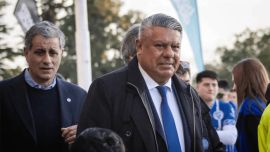Initial results from Argentina’s presidential election indicate that ruling coalition candidate Sergio Massa has overturned the odds to finish first but that the race for the Casa Rosada will go to a run-off next month.
Massa, 51, the economy minister running for Unión por la Patria, had 36.35 percent of votes with 91.84 percent of polling stations reporting, electoral authorities announced just after 10pm on Sunday night.
The partial count showed libertarian frontrunner Javier Milei will join him in the run-off after the outsider economist breezed past the challenge of opposition leader Patricia Bullrich.
Milei, 53, representing La Libertad Avanza, had 30.16 percent of votes cast, ahead of Bullrich, the candidate for the opposition Juntos por el Cambio coalition. The 67-year-old former security minister has 23.83 percent.
In fourth and fifth place in the race for the Presidency were Juan Schiaretti, 67, of Hacemos por Nuestra País on 6.97 percent and left-winger Myriam Bregman, 51, of the Frente de Izquierda y de Trabajadores-Unidad, with 2.67 percent.
If the results continue in the same vein, it would be a remarkable performance by Massa, who was forecast to finish second at best. With inflation running at more than 138 percent annually and more than 40 percent of the population living in poverty, most pollsters and analysts had tipped Milei to top voters’ preferences.
To avoid a run-off election on November 19, a candidate needs to win 45 percent of the vote Sunday, or 40 percent with a difference of 10 points or more over the nearest rival.
Exit polls from multiple sources indicate that the vote is likely to go to a run-off vote, which would be staged on November 19.
To avoid a run-off election on November 19, a candidate needs to win 45 percent of the vote Sunday, or 40 percent with a difference of 10 points or more over the nearest rival.
In addition to the Presidency, voters are also choosing lawmakers for the lower house Chamber of Deputies and upper house Senate.
The provinces of Buenos Aires, Entre Ríos and Catamarca are also voting to decide their governors for the next four years. Citizens in the capital, Buenos Aires City, will define their next mayor.
More than 74 percent of the electorate had voted by the time polls closed. Those remaining in line were able to wait and cast their ballots. Voting is obligatory for those aged between 18 and 70 years of age.
‘Happy birthday’
Argentines went to the polls after an election campaign dominated by debate of how to reverse years of economic decline. Record inflation, recession and rising poverty propelled Milei, an outspoken economist who rages against the nation’s “political caste,” to the front of a tight race.
Hundreds of supporters swarmed around the lawmaker, chanting his name and singing "Happy Birthday" (Milei turned 53 on election day) as he arrived to vote at a polling station. Milei briefly stumbled under the crush of the crowd.
"Today we Argentines are taking part in the most important elections in recent decades. We will decide whether we want to build a powerful Argentina again or become the biggest slum in the world,” he said.
"We are prepared to form the best government in history," the outspoken economist declared to cheers from supporters.
Milei has vowed to dollarise the economy, slash spending, and "dynamite" the Central Bank in a bid to solve years of economic decay.
Massa faced an uphill task running for election given Argentina’s devastating economic indicators. The lead-up to the vote was marked by currency turbulence, with the peso weakening sharply against the US dollar on parallel exchange markets.
As he cast his ballot in Tigre on Sunday, Massa called for "calm", saying, "on Monday, Argentina goes on."
Bullrich, a stern, tough-talking leader, has vowed to enforce austerity and deliver radical change from the overspending, money-printing Peronists and their strict currency controls.
A former security minister, she served in the government of former president Mauricio Macri (2015-2019), a pro-market, non-Peronist who failed in his promise to contain spending and took out a record US$44-billion loan with the International Monetary Fund, which has bailed Argentina out 22 times despite several massive defaults.
As she cast her vote at the La Rural exhibition centre in Buenos Aires on Sunday, she confidently predicted: "I am going to be president."
"We have to wait for the result, but we are happy with what we have done and what we have offered the Argentine people," said Bullrich.
Economic jitters
Many are jittery over the impact of the Sunday’s vote on the volatile peso and runaway inflation, with the prospect of weeks of more uncertainty if the vote heads to a run-off on November 19.
"There is so much uncertainty... and fear, out of these candidates, there are none who represent me. There is no one who can change what we need here in Argentina," said graphic designer Maía Olguin, 40, who did not want to reveal her vote.
"I'll choose the lesser evil," said trader Raúl Narvaez, 64, who also said he was unimpressed with the options.
With poverty and destitution on the rise, and a middle class brought to its knees by soaring price hikes, many voters are keen to see the back of the traditional parties they view as the architects of their misery.
"Obviously I voted for Milei," said Esteban Montenegro, 24, who said he works in sales in Buenos Aires. "But it is not that I have all the confidence in the world, or that I think he will do everything, but he is the only one giving solid, transparent proposals."
Among those casting their ballot early Sunday morning was Norberto Milei – father of the presidential candidate.
"I hope he does well, for my sake, for the sake of all Argentines. Let the people choose, let them know what they are going to do, but a change is needed," the 80-year-old retired businessman told Perfil before he voted in Vicente López.
'Anarcho-capitalist'
Milei, a libertarian economist, blindsided pollsters when he surged to the front of the election race, winning an August primary with 30 percent of votes.
Analysts say his spectacular surge follows the regional trend towards anti-establishment parties, and he is often compared to former US president Donald Trump or Brazil's Jair Bolsonaro.
The self-described "anarcho-capitalist" with dishevelled hair and a rock-star persona has shown up at rallies with a powered-up chainsaw, vowing to slash public spending by 15 percent.
He is against abortion and sex education, wants to ditch about ten government ministries, and does not believe humans are responsible for climate change.
Massa represents the ruling centre-left Peronist coalition, a populist movement heavy on state intervention and welfare programmes that has dominated Argentine politics for decades but has grown deeply unpopular.
Having overseen the country's recent economic pains, he has been an easy punching bag for his rivals.
To woo voters, Massa went on a pre-election spending spree, slashing income tax for much of the population in a move analysts say will only make the country's fragile financial situation worse.
He sought to position himself as a responsible candidate who could work with figures from across the political spectrum, vowing to establish a “national unity” government to right Argentina’s economic wrongs.
While Milei led in the polls in the lead-up to election day, analyst Carlos Gervasoni of the Universidad Torcuato Di Tella said these have proven unreliable and "anything can happen."
Most analysts and pollsters forecast that Milei will either face Massa or Bullrich in a run-off.
– TIMES/PERFIL/AFP


























Comments